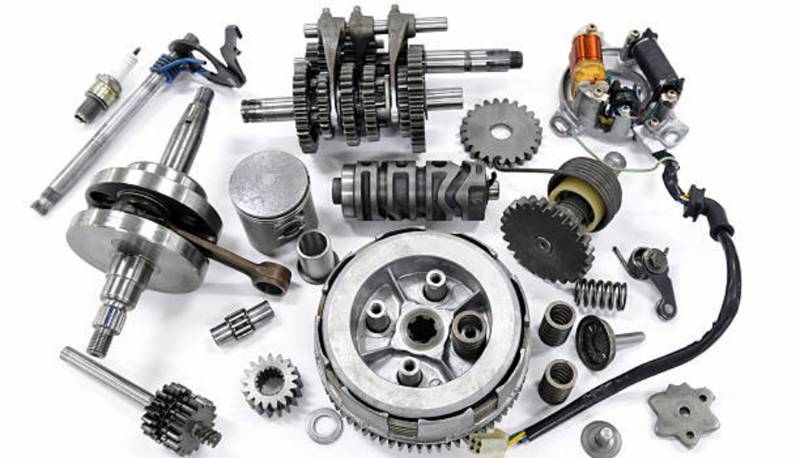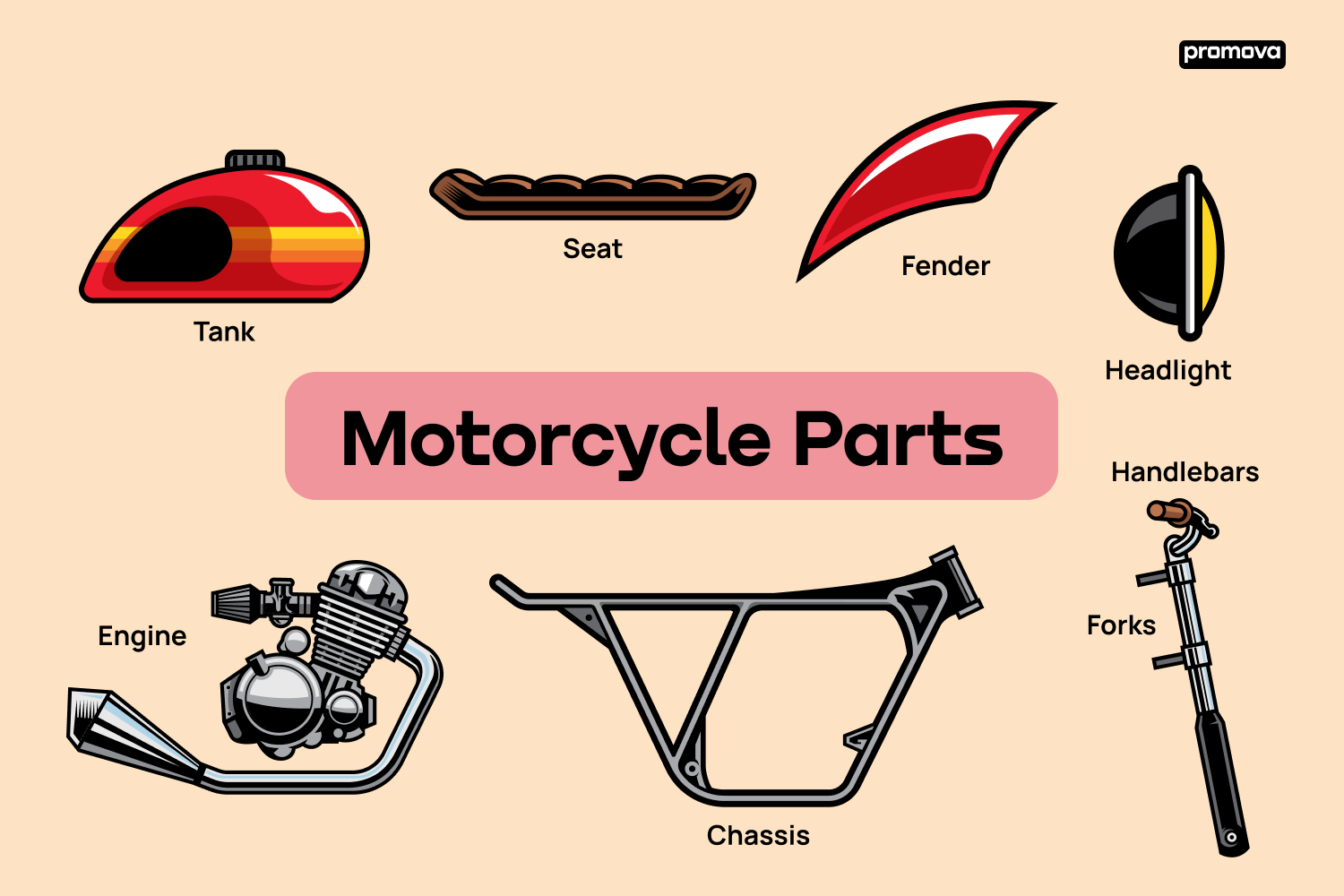Understanding the Hidden Advantages of Premium OEM Parts New Zealand
Understanding the Hidden Advantages of Premium OEM Parts New Zealand
Blog Article
Discover the Necessary Motorcycle Parts You Required for Optimal Efficiency
Recognizing the important parts of a motorbike is essential for accomplishing peak efficiency. Each component, from the engine to the braking system, plays a critical role in overall capability and safety and security. Routine maintenance can avoid unforeseen failings and enhance the riding experience. However, several motorcyclists overlook the details of these systems. Finding exactly how they work with each other can lead to a more reliable ride. What vital parts should every motorcyclist focus on?
The Engine: The Heart of Your Motorcycle
The engine functions as the core component of a motorbike, driving its performance and specifying its capabilities. It is accountable for converting fuel right into power, which powers the bike onward. Different types of engines are utilized, consisting of single-cylinder, V-twin, and inline setups, each offering unique qualities suited for different riding designs and purposes. The engine size, typically measured in cubic centimeters (cc), substantially influences performance, with larger engines typically supplying more power and torque.Furthermore, the engine's design and technology, such as fuel injection systems or air-cooling versus liquid-cooling, affect performance and dependability. Upkeep is vital for peak procedure; aspects like normal oil adjustments and monitoring trigger connects guarantee long life. Riders frequently take into consideration an engine's responsiveness and smoothness, as these qualities boost the general riding experience. Inevitably, the engine stays a vital component that specifies not just the motorbike's performance yet additionally the cyclist's connection to the device.
The Transmission: Changing Gears Efficiently
The transmission plays an important function in a motorbike's efficiency, especially in the technicians of equipment shifting. Recognizing just how to shift equipments smoothly can improve the overall riding experience, while regular upkeep guarantees peak capability. Proper attention to these facets can substantially affect the longevity and effectiveness of the motorcycle.

Equipment Shifting Mechanics
Smooth equipment moving is important for perfect motorbike performance, greatly influencing both velocity and control. The mechanics of gear shifting involve the communication in between the clutch, equipment lever, and transmission system. When a motorcyclist engages the clutch, it disengages the engine from the transmission, enabling an equipment adjustment without harming the elements. A well-timed launch of the clutch, combined with exact movement of the gear lever, promotes a smooth modification between gears. This process ensures that the engine runs within its ideal power band, enhancing performance. Oem Parts New Zealand. Furthermore, comprehending the gear proportions and their result on rate and torque can help cyclists make notified selections throughout changes, eventually adding to an extra responsive and enjoyable riding experience
Upkeep Tips Value
Regular maintenance plays a crucial duty in guaranteeing that the transmission system runs successfully, enabling smooth gear changes. On a regular basis changing the transmission and checking fluid is vital, as old liquid can result in boosted rubbing and wear. In addition, checking the clutch for wear warranties peak engagement and disengagement, avoiding slippage throughout gear modifications. Lubrication of moving components is just as essential to reduce rubbing and enhance performance. Motorbike owners ought to additionally keep track of for leakages and uncommon noises, as these can show underlying concerns. By adhering to these maintenance tips, motorcyclists can lengthen the life expectancy of their transmission system, ensuring that gear changes remain seamless and adding to the overall efficiency of their motorcycle.
The Braking System: Ensuring Safety And Security on Every Experience
Braking systems are essential elements that directly affect a motorbike's security and efficiency. They include various parts, consisting of brake pads, blades, calipers, and hydraulic lines, all collaborating to ensure efficient slowdown. The sort of stopping system-- generally either disc or drum-- impacts responsiveness and quiting power.Regular upkeep is necessary to support peak efficiency; used brake pads can result in decreased effectiveness and raised quiting ranges. Additionally, the quality of brake fluid ought to be kept track of, as it can soak up wetness over time, jeopardizing stopping efficiency.Riders ought to also consider the significance of anti-lock stopping systems (ABS), which prevent wheel lockup throughout abrupt stops, boosting overall security. Appropriately functioning brakes are not nearly quiting; they infuse self-confidence in the biker, enabling safer navigating via various surfaces. Eventually, a dependable braking system is important for appreciating every trip with comfort.
The Suspension: Enhancing Comfort and Control
A well-functioning suspension system substantially adds to a motorbike's overall performance, enhancing the effectiveness of the stopping system. The suspension plays a significant function in absorbing shocks from irregular surfaces, assuring a smoother trip while preserving tire contact with the roadway. This call is necessary for both stability and control, permitting bikers to browse edges with self-confidence and precision.Different kinds of suspension systems, such as telescopic forks or mono-shocks, provide varying levels of convenience and handling. Properly tuned suspension enhances responsiveness, supplying the rider with a more connected feel to the motorbike. Normal upkeep checks are vital to identify the suspension parts, consisting of dampers and springs, are functioning at their best. A reliable suspension system not just raises the riding experience but also adds to the longevity of various other motorbike parts by minimizing deterioration. Because of this, purchasing top quality suspension is vital for any type of severe motorcycle enthusiast.
The Tires: Linking You to the Roadway
Tires play a necessary role in a motorcycle's performance, functioning as the key link between the rider and the roadway. Comprehending the various kinds of tires available can greatly affect taking care of and security. In addition, normal maintenance is important to assure peak tire efficiency and longevity.
Tire Types Explained
Exactly how do different tire kinds affect a motorcycle's performance? Tire types play a crucial duty in determining a motorbike's grip, stability, and handling. Sport tires, designed for high efficiency, offer improved grip and responsiveness on smooth roads, making them optimal for competing and hostile riding. Conversely, touring tires prioritize sturdiness and comfort, offering a smoother trip for long-distance travel. Off-road tires, defined by their sturdy step patterns, master grip on unpaved surface areas, appropriate for adventure fanatics. Furthermore, dual-sport tires blend characteristics from both on-road and off-road groups, satisfying flexible riding demands. Eventually, choosing the ideal tire type is necessary for optimizing performance, guaranteeing safety and security, and enhancing the overall riding experience.
Upkeep Tips Offered
While riding when traveling, keeping optimal tire condition is essential for safety and performance. Routinely inspecting tire stress is essential, as under-inflated tires can bring about bad handling and raised wear. It is recommended to check walk deepness frequently; used tires compromise grasp and security. On top of that, bikers need to seek indicators of damages, such as cracks or lumps, which can suggest the need for substitute. Rotating tires periodically assures even wear, improving durability. Additionally, keeping tires clean from particles and preventing extreme visit this site visuals can prolong their life-span. Keeping appropriate alignment and equilibrium adds to peak performance, lessening stress on various other bike elements. Complying with these upkeep suggestions will substantially improve the general riding experience.
The Gas System: Sustaining Efficiency and Performance
The fuel system plays a vital function in making best use of a motorbike's efficiency and performance, as it assures the optimum delivery of gas to the engine. It comprises a number of critical parts, consisting of the gas container, gas pump, gas filter, and gas injectors or carburetor. Each component has to work successfully to guarantee a smooth and powerful ride.The gas container shops gasoline and supplies it to the engine through the gas pump, which generates the needed pressure. A fuel filter stops pollutants from entering the engine, while the injectors or carburetor mix fuel with air for combustion.Proper maintenance of the fuel system is crucial; a clogged up filter or malfunctioning injector can lead to reduced efficiency and enhanced fuel usage. By verifying that the gas system operates successfully, cyclists can take pleasure in better throttle response, much better fuel economic situation, and generally boosted riding experience.
The Electric System: Powering Your Trip
An effective electrical system is vital for the overall functionality and safety of a motorcycle, as it powers important parts such as the ignition, lighting, and numerous digital systems. This system includes the battery, which stores energy, and the generator, accountable for generating power while the engine runs. The circuitry harness attaches these components, ensuring reliable power distribution.Additionally, fuses shield the system from overloads, while relays help manage high-current gadgets with low-power signals. A well-maintained electrical system boosts performance by guaranteeing smooth beginnings and constant procedure of lights and signals, essential for motorcyclist presence and safety.Regular checks of the battery's charge and connections are necessary for stopping electric failings. Riders need to likewise check electrical wiring for wear and tear, ensuring all elements function ideally. Ultimately, a robust electrical system adds significantly to the general performance and integrity of the motorbike.
Frequently Asked Inquiries
Just how Commonly Should I Replace My Motorcycle's Battery?
The frequency of motorbike battery substitute depends upon usage and upkeep (Bike Parts Wellington). Normally, batteries should be changed every 3 to 5 years. Normal checks can aid determine when a replacement is required for peak efficiency
What Tools Do I Required for Fundamental Motorbike Maintenance?
For fundamental motorcycle maintenance, one requires necessary tools such as an outlet set, wrenches, screwdrivers, pliers, tire stress scale, and a torque wrench. These devices assist in reliable upkeep and assure the motorcycle runs effectively and safely.
Just How Can I Enhance My Bike's Aerodynamics?
To improve bike the rules of aerodynamics, one need to think about adjusting fairings, making use of windscreen expansions, maximizing body setting, and lowering overall weight. These modifications help decrease drag, improving stability and gas performance during adventures.
What Are the Indications of a Failing Electric System?
Indications of a failing electrical system include dimming lights, trouble beginning, irregular tool analyses, and blown merges. Motorbike Components NZ. Uncommon scents or corrosion around battery terminals may also indicate underlying issues needing prompt focus for security and efficiency

How Do I Pick the Right Oil for My Motorcycle?
When picking oil for a bike, one must consider the producer's specifications, viscosity rankings, and the type of riding. Additionally, standard versus synthetic oil can impact efficiency and engine defense, affecting the choice substantially. The engine size, generally determined in cubic you can find out more centimeters (cc), significantly influences performance, with larger engines generally supplying even more power and torque.Furthermore, the engine's style and innovation, such as gas injection systems or air-cooling versus liquid-cooling, influence effectiveness and reliability. A well-functioning suspension system substantially adds to a motorbike's general efficiency, matching the effectiveness of the braking system. The fuel system plays a crucial duty in optimizing a motorbike's performance and effectiveness, as it assures the click over here now optimal distribution of gas to the engine. A fuel filter prevents impurities from entering the engine, while the injectors or carburetor mix gas with air for combustion.Proper upkeep of the gas system is important; a blocked filter or malfunctioning injector can lead to decreased efficiency and enhanced gas intake. A well-maintained electrical system enhances efficiency by making certain smooth beginnings and constant operation of signals and lights, essential for rider visibility and safety.Regular checks of the battery's charge and connections are essential for preventing electrical failings.
Report this page